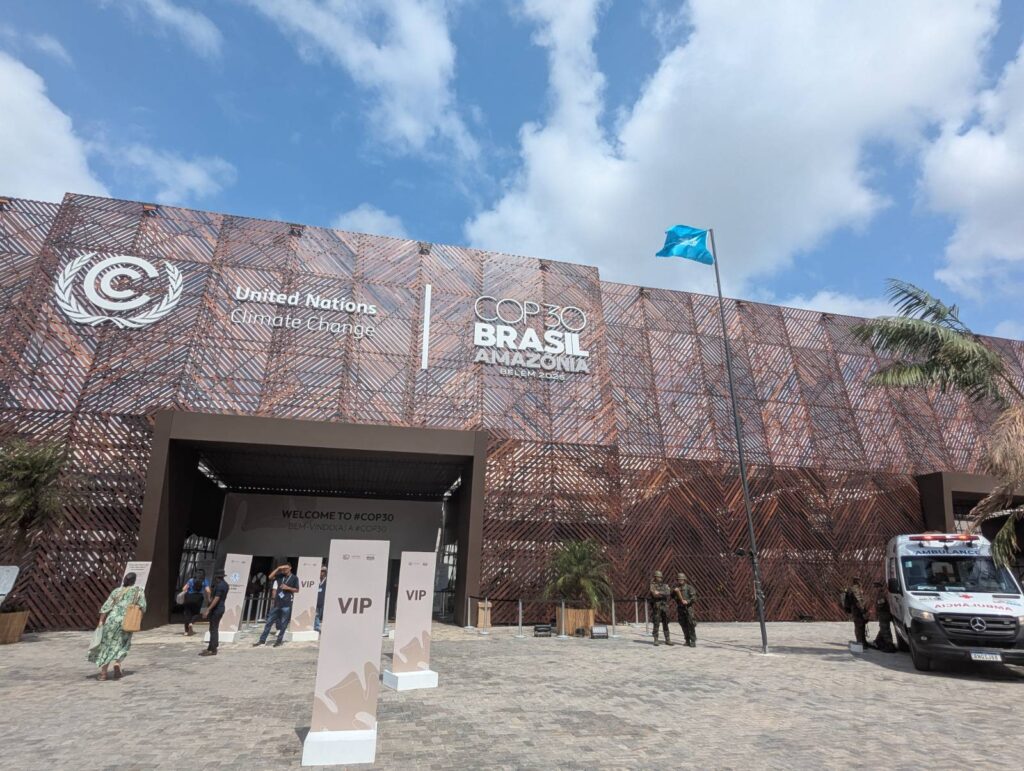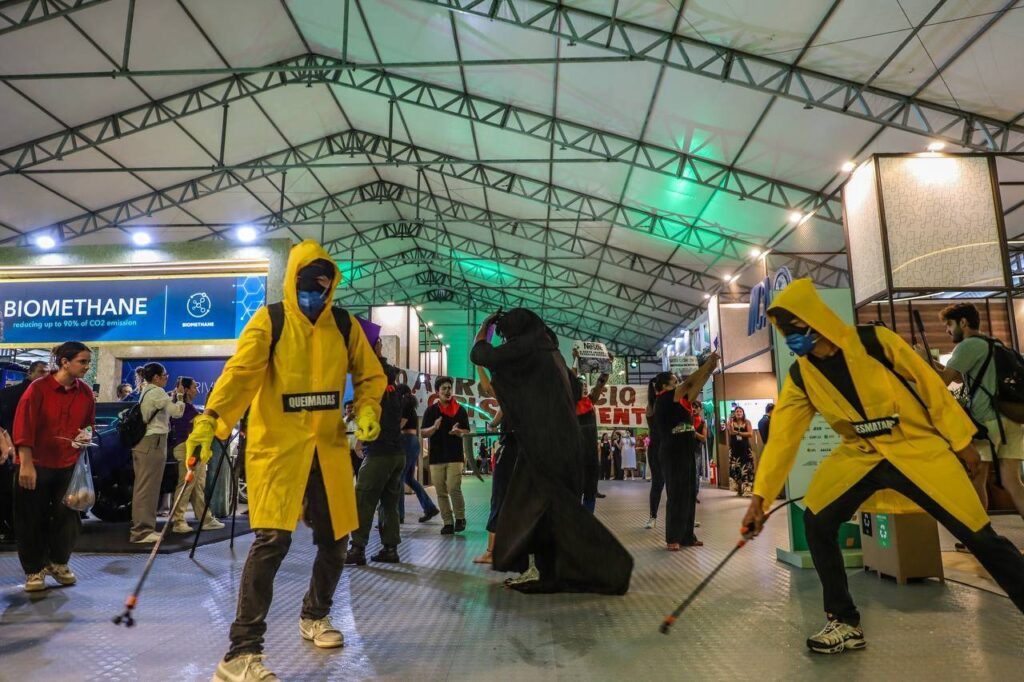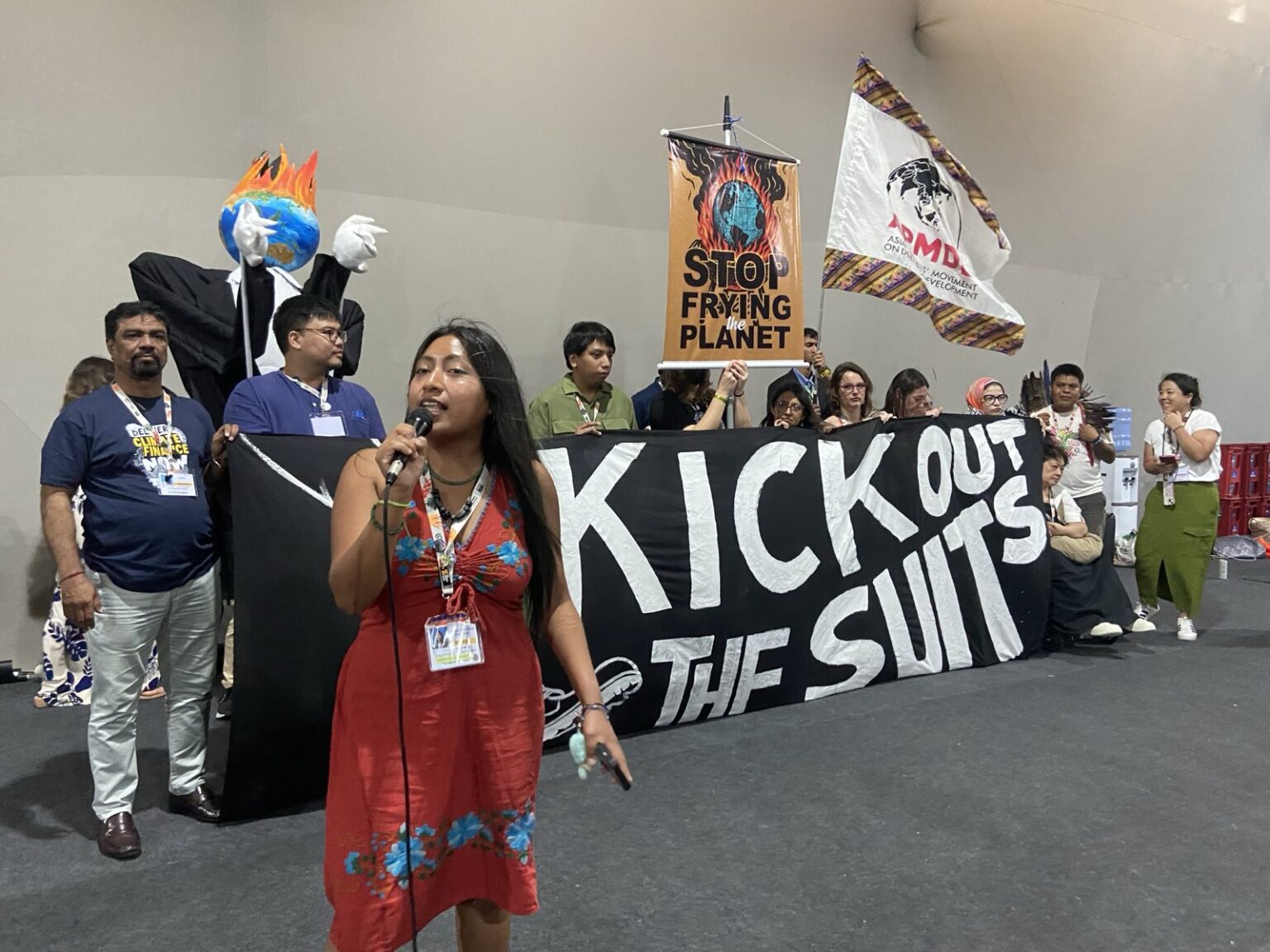More than 300 lobbyists for food and farming organisations have participated at this year’s United Nations climate talks, known as COP30, taking place in the Brazilian Amazon, where agribusiness is the leading cause of deforestation, a new investigation has found.
The number of lobbyists representing the interests of industrial cattle farming, commodity grains and pesticides is up 14 percent over last year’s summit in Baku — and is larger than the delegation of the world’s 10th largest economy, Canada, which brought 220 delegates to COP30 in Belém, according to the joint investigation between DeSmog and the Guardian.
One in four lobbyists are at COP30 as part of an official country delegation. A small subset of these delegates (six) gets privileged access to the U.N. negotiations where countries are meant to be hashing out ambitious policies to curtail climate catastrophe.
Scientists say it will be impossible to meet the goals of the 2015 Paris Agreement without radical changes to the way we produce and consume food.
Agriculture is responsible for a quarter to a third of global emissions. Around half of this is methane, a potent greenhouse gas emitted by the digestive systems of ruminant livestock like cattle.

A version of this article was published by The Guardian.
The revelations come amid growing frustration at the access given to corporations and trade groups that profit from maintaining global dependence on fossil fuels and/or the destruction of forests and other ecosystems vital for mitigating climate catastrophe.
Large producer countries and companies have in the past used COPs to weaken agreed texts in negotiations, and argue against solutions climate scientists say are needed to reach Paris goals. There are growing calls — including from a former U.N. Secretary General — to curb the influence of companies in the international process.
This year’s industrial agricultural presence is a 71 percent rise on COP27 in Sharm el-Sheikh, but down from the record numbers in Dubai, which was the largest ever U.N. summit with 86,000 delegates, compared to 56,000 in Belém. In Brazil, agribusiness has made a concerted effort ahead of the summit to burnish its green credentials among the public, to Brazilian decision-makers, and in front of the world’s leaders.
“At COP30, more than 300 agribusiness lobbyists occupied the space that should belong to the forest peoples,” said Vandria Borari, an Indigenous leader of the Borari territory of Alter do Chão in the Lower-Tapajós region of Pará, where COP30 is being held. “Nothing about the Amazon can be decided without listening to those who live in it.”
“What’s happening in Belém is not a climate conference but a hostage negotiation over the future of the planet where those holding the detonators — the soy barons, the beef cartels, the pesticide peddlers — are somehow seated at the table as honest brokers,” said Raj Patel, research professor in the Lyndon B Johnson School of Public Affairs at the University of Texas.
“They have encouraged the world to look away from the land being cleared, the cattle being fattened, and the carbon being released from soil that held it for millennia.”

Destructive Companies and Industry Groups
The delegations include some of the most emitting companies in the world. Brazil’s three largest meat companies — JBS, MBRF and Minerva brought 13 delegates to COP30, eight of whom came in Brazil’s government delegation.
A recent analysis from Friends of the Earth US found the emissions of these three companies are equal to the footprint of British multinational oil major BP.
Cattle ranching is the biggest driver of deforestation in the Amazon, followed by the industrial production of soy, which is mostly used for animal feed. Scientists have warned that as much as half of the Amazon rainforest could hit a tipping point by 2050 as a result of water stress, land clearance, and climate disruption.
The pesticide company Bayer brought 19 delegates, the highest number of lobbyists of any single company. Fertilizer firm PT Pupuk Indonesia brought 10 delegates, and the meatpacker JBS brought 8 delegates – including its CEO, Gilberto Tomazoni — and food giant Nestlé brought 9. Commodities giant Cargill brought 5 delegates, while the food and beverages firm Pepsico and fast-food chain McDonald’s brought 7 and 2 respectively.
Bayer and Nestlé are both “diamond” sponsors of the COP30 Agrizone, a dedicated space for agriculture held outside of the official COP, which is hosting a range of events from the world’s largest emitters.
Located a 10-minute bus ride from the U.N. site, the Agrizone is home to scores more industrial agribusiness lobbyists, whose events are receiving a steady stream of visitors from the Blue Zone, including Brazilian politicians, country negotiators, and the Queen of Denmark, a press officer for Embrapa told DeSmog.
“These findings are proof that industrial agriculture, the third largest contributor of global emissions, has been allowed to co-opt the climate convention,” Lidy Nacpil, from the Asian Peoples Movement on Debt and Development, said. “Bayer and Nestlé have also been given unprecedented influence at COP with their sponsorship of the Agrizone, a space dedicated entirely to greenwashing Big Ag.”
“COP will never deliver real climate action as long as industry lobbyists are allowed to influence governments and negotiators. We demand an accountability mechanism that will push polluters out of COP and protect our people’s right to food.”
When asked for comment by DeSmog, a spokesperson for Bayer said in a statement: “Bayer stands by the Paris Agreement, is on track to reduce our own emissions in line with the 1.5C target, and drives innovations in health and agriculture to reduce emissions across the agricultural supply chain. We have been transparent on our COP engagements … we firmly support actions to avert the climate crisis. The process needs all hands on deck.”
In a statement, MBRF, Brazil’s second largest beef company, stressed that its presence at the U.N. negotiations was “exclusively technical” and “focused on constructive dialogue”. It added that MBRF “does not participate in the U.N.’s formal negotiations, and does not engage in lobbying”. Instead, it aims to share “already implemented solutions that demonstrate the feasibility of low-emission livestock farming, with zero conversion and no deforestation”.
Beef company Minerva told DeSmog in a statement: “In recent years, the Company has been actively involved in the COPs, reinforcing its belief that livestock production can contribute to climate solutions when supported by science, strong governance, and long-term commitment. The private sector’s involvement is fundamental to advancing the climate agenda.”
JBS said in a statement that, as a food company, it is “concentrated on increasing farm productivity, enhancing food system efficiency, and reducing food loss and waste,” adding that the company was chair of the Food Systems Working Group of the Sustainable Business COP30, a COP-presidency endorsed global business alliance, which aligns with the U.N.’s Marrakech Partnership for Global Climate Action.
Nestlé did not respond to a request for comment.

Trade Groups
A third of all the agriculture lobbyists this year are from Brazil, the world’s top meat exporter, where agriculture is responsible for 74 percent of greenhouse gas emissions.
Companies were represented by powerful lobby groups, including the beef exporters association ABIEC, and Brazil’s most powerful industry group, the Brazilian National Confederation of Agriculture and Livestock (CNA).
CNA, which brought 30 lobbyists to Belém, brings together rural federations and unions from across the country and serves as the agribusiness sector’s main lobbying arm in Brazil’s congress, influencing agendas and policies in defence of the industry.
It has supported several proposed anti-environmental laws, including a bill that restricts the demarcation of and access to land for Indigenous populations. The group also attempted to overturn the Amazon Soy Moratorium, a landmark voluntary agreement to block the sale of soy linked to deforestation.
Other powerful industry associations on the ground in Belém include North American big-hitters, including the Meat Institute — which represents 350 meat packing and processing companies that produce 95 percent of the meat and poultry in the United States.
The Institute has been a consistent lobbyist in the United States against climate regulations, including by opposing regulators’ attempts to force companies to disclose the full extent of their emissions — a prerequisite of ambitious climate action. It spearheads the ProteinPACT — a voluntary initiative touting the sustainability credentials of the meat industry, but which does not support absolute emissions reduction targets.
Overall there was a reduction in the number of groups coming from the U.S., which had 26 agribusiness delegates, (down from 34 last year), and a rise in groups coming from Brazil and Latin America. Groups from both the U.S. and Latin America have used misleading arguments to present agribusiness as a “solution” to climate change at the summit.
“In the United States, agribusiness corporations and trade groups spent well over half a billion dollars lobbying congress between 2019 and 2023 for legislation that favours their bottom line,” said Karen Perry Stillerman, from the Food and Environment Programme at the Union of Concerned Scientists. “It’s no surprise Big Ag is following the same play book globally. We won’t have sustainable, fair, healthy, or climate-resilient food systems anywhere in the world as long as giant agribusiness and food corporations are making the rules.”

Lobbyists by Sector
Meat and dairy corporations sent the largest number to the climate talks, accounting for 72 of the total 302 delegates, almost double the number negotiating on behalf of Jamaica, the Caribbean island nation left devastated by Hurricane Melissa last month in a super storm scientists say was made more intense by human-made global heating. India, a country of 1.45 billion people facing major climate challenges, sent a delegation of 87 negotiators.
The meat and dairy sector included numerous advocates of the alternative methane metric GWP*, which is criticized for letting major livestock polluters downplay their emissions — including a delegation from Beef + Lamb New Zealand, which has said COP30 presented an opportunity to push for the metric.
Europe’s largest fertilizer corporation, Yara, brought five delegates with its home country Norway. The synthetic fertilizer industry is a major user of fossil fuels which are typically required in the production of nitrogen-based fertilizer, which is a key driver of rising agricultural emissions.
Agrochemicals — pesticides and synthetic fertilizers — account for 60 delegates at the talks, and the bioenergy sector has 38 representatives — a 138 percent jump since last year, driven by a rise in attendees from key trade associations such as the World Biogas Association.
The bioenergy sector stands to benefit from multiple key topics on the table at the summit, including decisions over biofuels — many of which are produced from agricultural commodities driving deforestation, such as corn and soy.
Brazil is pushing for a quadrupling in the use of biofuels, which are often marketed as a green energy, but according to a recent study, can generate 16 percent more emissions than fossil fuels, due to the land-use impacts of growing monoculture crops.

Lobby Zones Across Belém
The U.N. is under pressure to enact reforms to lessen the power of lobbyists. Many were cheered by the UNFCCC announcing transparency reforms earlier this year, which require COP attendees to cite their affiliations.
According to new research from Transparency International, of the list, 54 percent of participants in national delegations either did not disclose the type of affiliation they have or selected a vague category such as “guest” or “other.”
Several national delegations — including Russia, Tanzania, South Africa and Mexico — did not disclose the affiliation of any of their delegates holding a party badge, highlighting a worrying lack of transparency, even at the country level.
“Transparency is the cornerstone of trust in global climate negotiations,” Brice Böhmer, Climate and Environment Lead at Transparency International said in a statement accompanying the analysis, released last week. “Yet, at COP30, thousands of delegates still do not share enough information, most from within national delegations.
“If COP30 is indeed, the COP of truth, the Presidency and the UNFCCC Secretariat should now commit to reviewing and strengthening participant disclosure rules ahead of future summits, ensuring integrity and accountability at every level,” he said.
The provisional list of UNFCCC participants only includes delegates who can access the U.N.’s COP30 Blue Zone, but lobbyists are also active elsewhere in the city of Belém.
The Agrizone is thought to host as many as 57 additional agricultural representatives, according to Repórter Brasil.
Agriculture companies are also holding invite-only events at venues, such as the agrochemical giant Bayer’s renovated Casa de Bayer and Regen House, which is hosting talks by the ProteinPACT.
“The solution to the climate is not in the lobbies,” said Indigenous leader Vandria Borari. “We are the true guardians of the forest. And the world needs, finally, to listen to us.”
All companies named in this article were approached for comment.
Additional research and reporting by Brigitte Wear and Clare Carlile. Edited by Hazel Healy.
Methodology note
DeSmog analysed the provisional list of UNFCCC COP30 delegates. The list was analysed for the largest corporations in major food sectors – meat and dairy, pesticide and fertiliser firms, food processors, commodity and seed traders, (agricultural) bioenergy and grocery retail – which wield significant control in a highly concentrated food chain, and account for the majority of trade. Large national companies are included only when they are known to be high-emitting firms and/or have a track record of lobbying against environmental and climate policy.
DeSmog also included global and regional industry trade groups, some of which brought their own delegations to Belém, along with national farmer unions and institutes that have corporate affiliations and/or a history of lobbying aligned with industry demands.

A version of this article was published by Franceinfo
Subscribe to our newsletter
Stay up to date with DeSmog news and alerts







